[HWPL]
[HWPL] HWPL's Peace Education Curriculum in Zambia
HWPL Official Homepage

HWPL Official Homepage

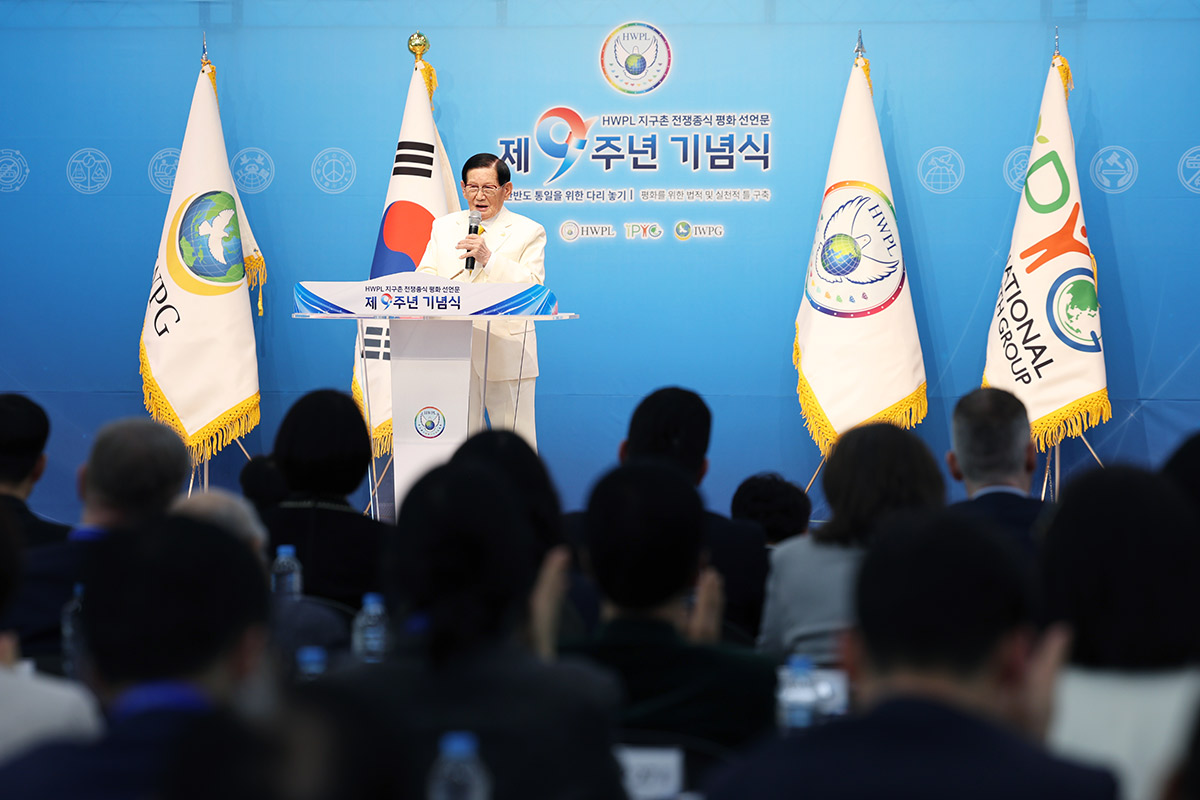
CHEONGJU, South Korea – March 14, 2025 – HWPL’s 9th annual commemoration of the Declaration of Peace and Cessation of War (DPCW) was held in 93 countries around the globe. During the main event in Cheongju, South Korea, a significant step was taken with the launch of the Preparatory Committee for Peaceful Unification on the Korean Peninsula. Under the theme, ”Building Bridges for Korean Reunification: Establishing Legal and Practical Frameworks for Peace,” the event in Korea drew about a thousand domestic and international leaders, and outlined a comprehensive plan for nationwide peace and unification.
HWPL has spearheaded the “Together: Connecting Korea” campaign. This initiative, which involves approximately 170 civic groups, aims to foster communication and harmony throughout Korean society. The newly formed committee will focus on expanding socio-cultural exchanges between North and South Korea and establishing a robust foundation for future unification.
“The expeditious path to unification lies in the implementation of free movement. It is imperative that we pursue unification through constructive dialogue without force,” said HWPL Chairman Lee Man-hee, presenting a vision for peaceful unification on the Korean peninsula. “Our country must become a testament to peace. We should work together thereby future generations can be happy and our wishes can come true.”
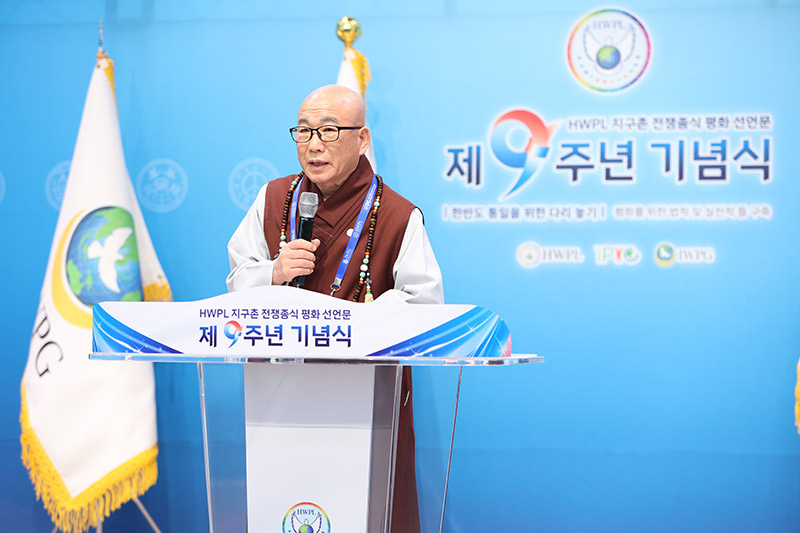
“We will unite people’s hearts through campaigns, expand the public understanding and support for unification through education, and conduct research on post-unification social and economic integration, said Ven. Seok Yeonhwa, chairman of the Supreme Patriarch of the World Buddhist Sangha Council as he explained the committee’s future plans.
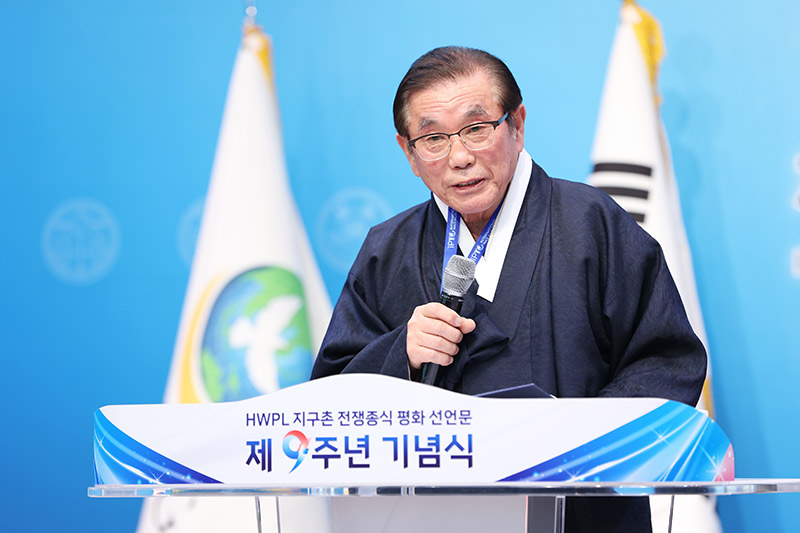
Kim Yeong-geun, the 32nd rector of Sungkyunkwan, emphasized the critical role of civilian exchanges, calling for “a legal and institutional framework to ensure their continuity, regardless of political shifts.”
A key component of the main event was the presentation of a draft of the constitution establishing a unified Korea by Professor Ciarán Burke of Friedrich-Schiller University Jena. Developed by the HWPL International Law Peace Committee, this draft establishes legal foundations for a unified Korea, including denuclearization goals and a peace system that protects citizens’ rights and welfare.
“(This initiative) will be furthering the cause of Korean unification, of future stability, and ensuring that the region – and the world – is likely to remain a more peaceful place,” Professor Ciarán Burke said.
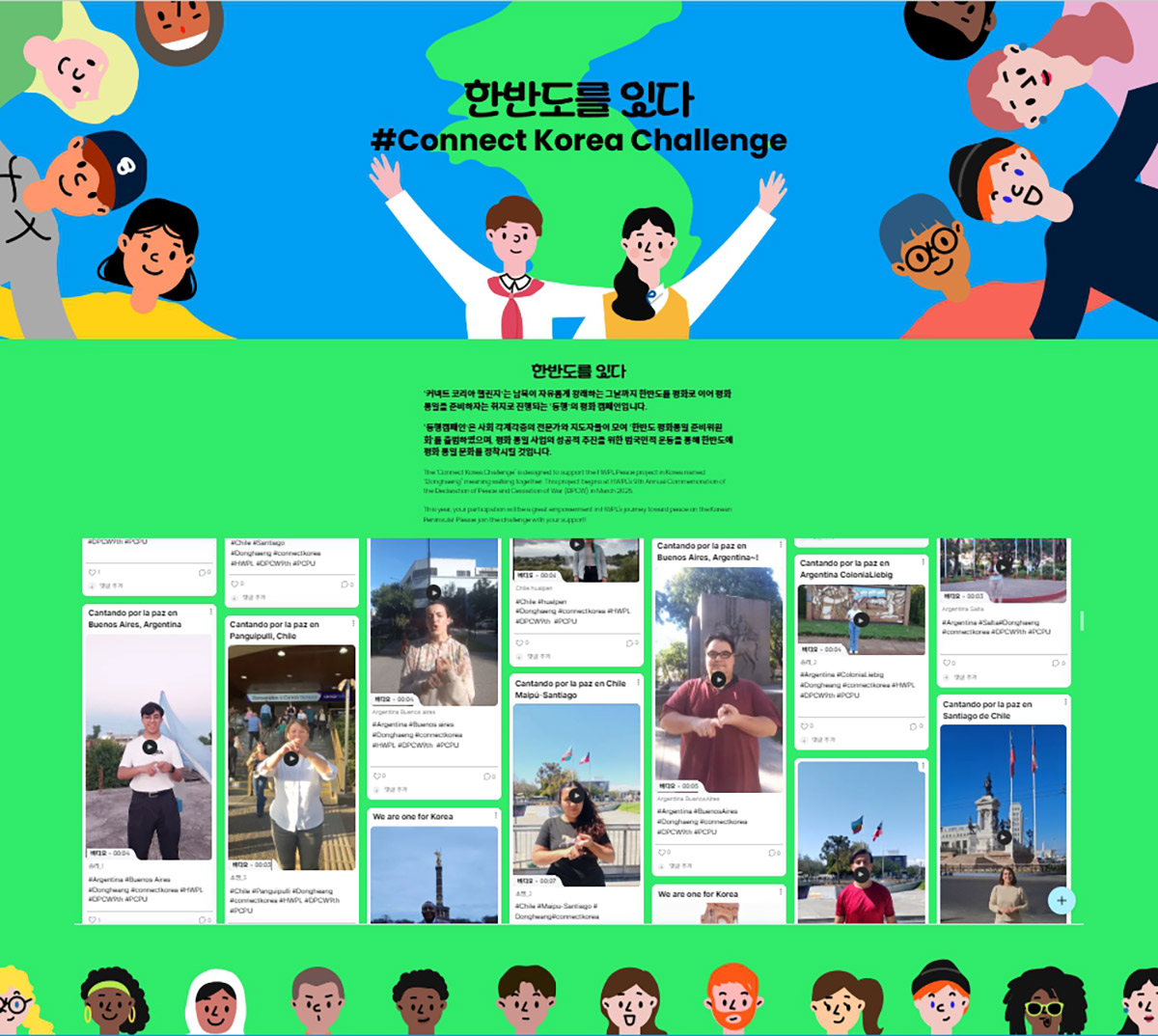
The Together Campaign’s Connect Korea Challenge is actively promoting unification through advocating free movement and international support. Within 10 days, participants from 243 cities across 72 countries contributed over 1,350 pieces of content, showing global interest in peaceful unification on the Korean Peninsula.
HWPL Official Homepage


Hello everyone. It’s nice to meet you. I hope this gathering today will bear beautiful fruit.
Our country has historically been small, poor, and isolated. Each nation has made us suffer in this way, but we have not yet perished. We are still alive. As long as the heaven exists, we too will exist. What is it that we hope and wish for? What does HWPL speak of and advocate for? It is cessation of war and world peace. We have made great efforts toward global peace and the cessation of war.
I have met with all presidents, prime ministers, and at least five key figures from each country, extending even to remote island nations around the world. When meeting with them, what I never forgot to do, and what created the closest relationship, was establishing brotherhood ties. Since we are brothers, we become like people from the same country, the same ethnicity, the same family. And we have discussed ways to achieve global peace. However, since the COVID pandemic hit, we haven’t been able to continue these efforts. Before that, I traveled to various countries, including island nations, working to achieve peace. As you well know, in the Mindanao conflict in the Philippines, many people died. Many people suffered greatly. For 40 years, neither the government nor any power or weapons could resolve this conflict. So, I went there.
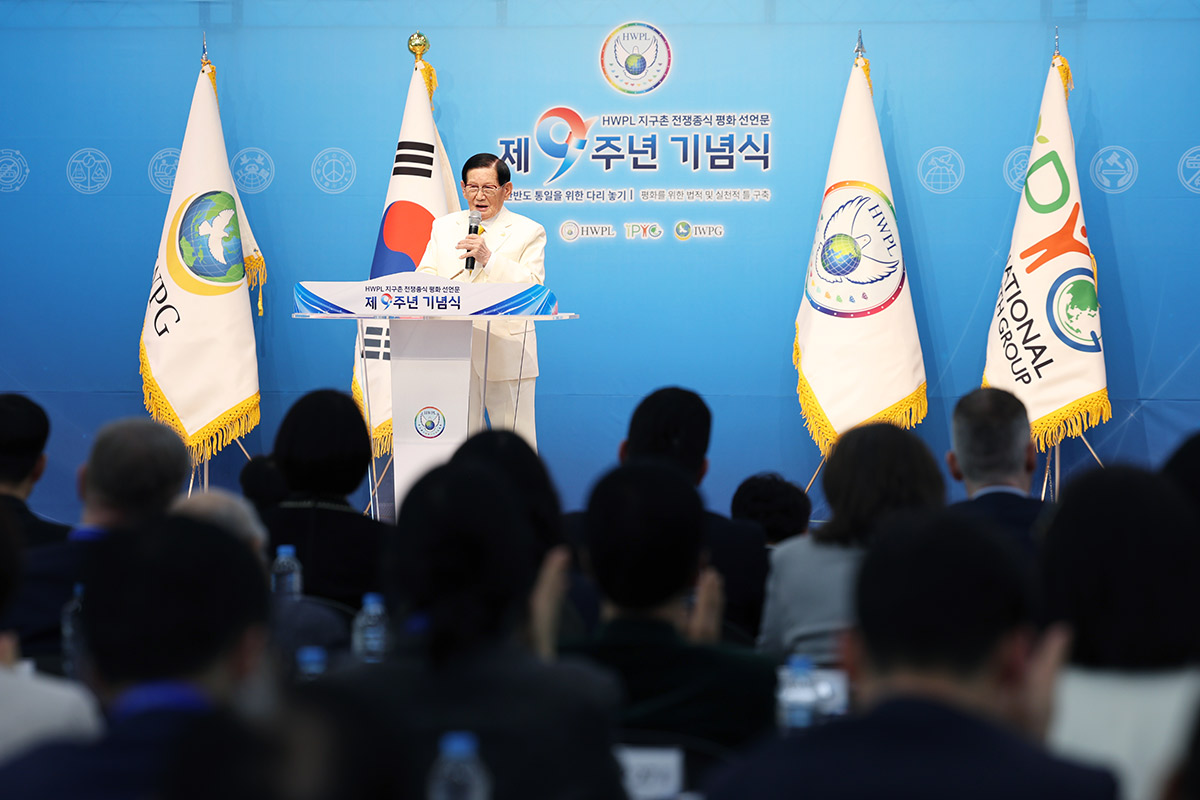
Why did I go? I went for the cessation of war and peace, saying ‘Let’s go.’ When I arrived there, there was also a large university. So, I went to the university to speak, and afterward, I went out to the streets and shouted alongside the students. That’s what happened. But people, not just a few people died, many people died. Is that all? Did the war end? It did not end. To make these people understand, there were truly many righteous things to be done, but these people were really good people. They were also people who, like us, hated war. And we achieved the cessation of war and peace in that country.
After that, I continued traveling to various countries around the world, forming brotherhood ties with presidents, prime ministers, and other notable figures. Through this, we established that we are one, not two. Everyone, this is how we made global peace possible. If we cannot achieve peace in this global village, there is nothing but death. Before we say ‘We love our family. We love our neighbors. We love our children,’ I persuaded these people that if we truly love, we must achieve the cessation of war in this world. And with the same heart, we agreed to create a peaceful world together. Was this just for a day or two? We have been doing this for many days. We have done this even to reach remote island nations. All for the sake of achieving peace.
Looking at the Christian Bible, there are about 70 passages about peace that appear there. There, peace. In the religious world too, there are examples of people shedding blood and making efforts for peace. But the human world must be protected by the human world. It speaks of peace. We must protect it. Who will protect it for us? Therefore, transcending all religions and all powers, we agreed to join hands solely for the cessation of war and peace in this global village, becoming brothers and sisters, becoming family, becoming one. And we have proceeded. In a very big way. We didn’t just start small and then give up. To that end, with the thought that we religious people should first show the light, religions too have worked to become one within this word ‘peace.’ Those who have worked with me in our country will all know this. But something unwanted, COVID came and interrupted this. It has been interrupted until now. However, we believe that peace will be achieved in even better ways going forward.
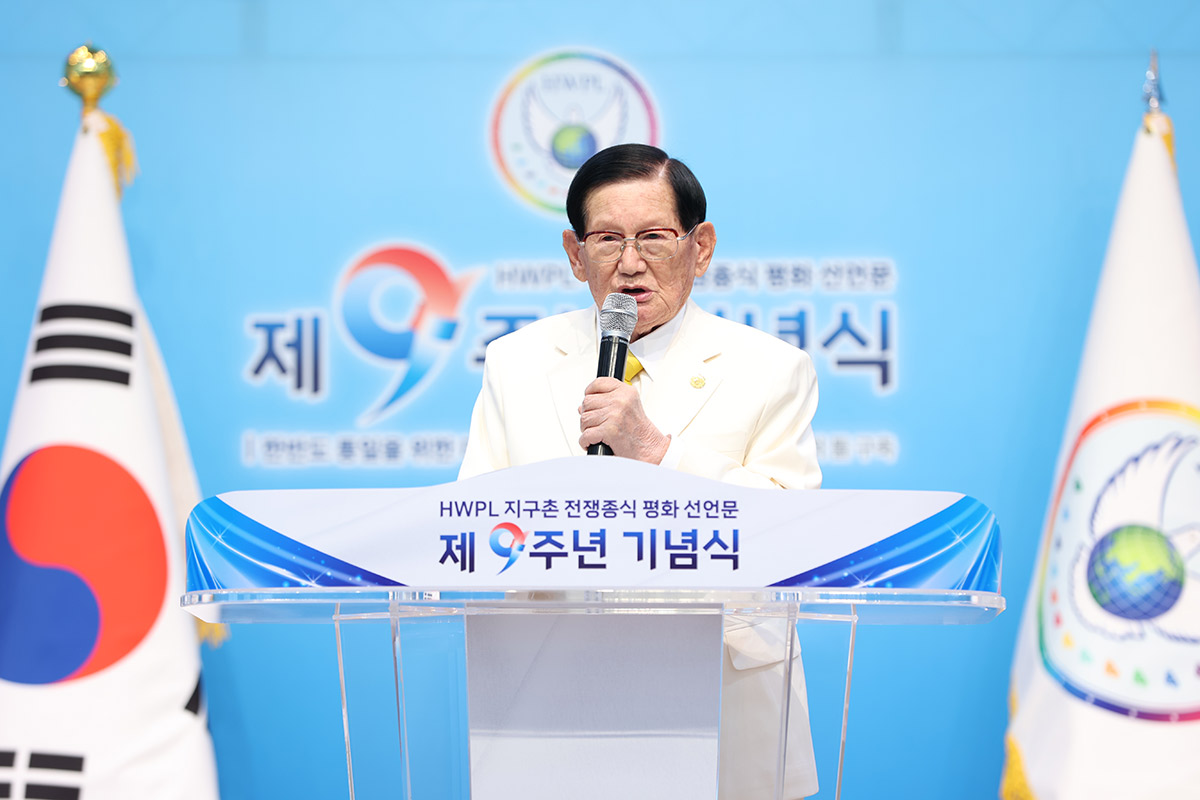
Everyone, we are not strangers to this peace. We are the parties concerned, and we ourselves are peace. So let us ensure that this global village is led to a peaceful world. We must do so.
And another point is that our Republic of Korea is a poor country and a small country. Isn’t it a country that has suffered greatly due to foreign powers? It is so. Such a country has now been torn into two parts again by foreign powers. A small country, this small country has been split in two. And we are fighting. Can peace be achieved this way? I believe this should not continue.
We are fighting because unification has not occurred. Another point is, why is it that our people, who have suffered so much at the hands of foreign powers, are blocked from traveling to our own country while people freely go to East Germany, America, Russia, and everywhere else? Who is blocking this? It is not our citizens who have blocked it. Can’t we just travel freely? Isn’t free travel the same as unification? Even now, we must break down these barriers. To allow free travel. This is the shortcut to unification. That is what I believe. Meeting parents, meeting siblings, meeting neighbors, meeting friends – wouldn’t this be the faster way to achieve unification? It is so. Should countries become enemies with each other and ethnicities become enemies with each other? Should it be this way?
It should not be this way. We should travel back and forth and communicate with each other. Isn’t it because we haven’t done this that we are fighting, waging war, and shooting at each other? Why must we point guns at the hearts of our own people? Why must we kill our own people? Should there be such division among the same ethnic group in this country that has experienced suffering and death at the hands of foreign powers until now? Everyone, think about it. What would our descendants in the future say if they could see us today? Would they not say that there were no people, no adults in this day and age? That is what I’m saying. Therefore, we must first open the path for travel between North and South. Yes, we must.
I believe there absolutely must be free movement between the two sides. That’s right. What kind of country is our country? What kind of people are we? We are a very strong, resilient, and remarkable country and people. These are people who know how to stand tall again even after being trampled by the world for decades and centuries. Therefore, I believe that our country must achieve unification on our own, without interference from foreign powers. It must be so. In such a unification, foreign powers should absolutely not allow military force to intervene in unification. Since we are human beings after all, I believe we must achieve unification through dialogue.
In my heart, the purpose was to go to North Korea and achieve unification because we are the same people. This should continue to be the case in the future. Everyone, our country is a very small country. It’s a country that has suffered greatly and endured much sorrow due to foreign powers. Shouldn’t we become one now, for this is the country our ancestors passed down to us? Isn’t this the people our ancestors passed down to us? We must become one. And let us work together. They say there is nothing that cannot be accomplished with effort. Certainly, our country will be unified.
As people of this nation, as descendants of this country, we must unify even if only to become a shining light that illuminates the whole world. Everyone, this is how it must be. Our country should become a monument that is known to the whole world. A monument of peace, that is. A monument of peace, right. That is what we should do. In this way, let us create good deeds so that future generations will rejoice and even our souls will be able to rejoice. Right?
Everyone, I would like to meet you frequently. Since God created this global village and also created people, if these people go wrong, God’s heart will not be at ease, so please take care of all these people. Also, give us hearts that can understand all these promises that God has made. That’s what I will pray for. So let us do well together eternally in the future. Let us fulfill our hopes. Heaven will be with us. Yes, thank you.
HWPL Official Homepage

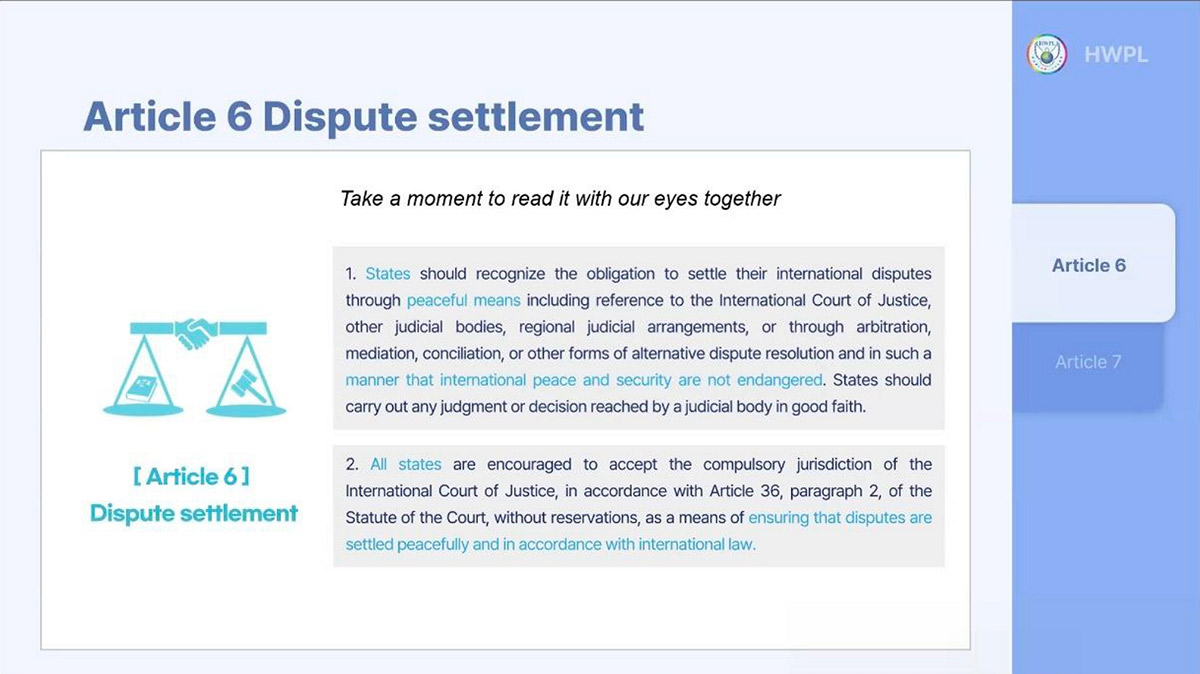
▲ Explanation of the Detailed Provisions of the DPCW
On February 22, 2025, HWPL hosted an online seminar titled “How to Achieve Peace? The Answer is in DPCW,” aimed at promoting the contents of the “Declaration of Peace and Cessation of War” (DPCW), sharing its vision and feasibility, and providing a platform for peace activists to engage in meaningful discussions.
Around 70 peace activists, including high-ranking government officials, legal experts, educators, and journalists from 13 countries, attended the event to share their perspectives and discuss ways to achieve peace. Notable participants included the Ambassador and Permanent Representative of Timor-Leste to the United Nations, the Secretary of State for Art and Culture of Timor-Leste, the President of Committee G of the Parliament of Timor-Leste, and a Member of Parliament from South Sudan.
HWPL announced the “Declaration of Peace and Cessation of War (DPCW)” on March 14, 2016, in collaboration with international law experts from 15 countries. The purpose of the DPCW is to end wars and establish sustainable peace. Comprising 10 articles and 38 clauses, the DPCW emphasizes core values such as “conflict prevention,” “conflict resolution,” and “maintaining sustainable peace.” HWPL has been actively working toward having this declaration adopted as a UN resolution.
The seminar began with an introduction to HWPL, followed by congratulatory speeches from the UN Ambassador of Timor-Leste and a Member of Parliament from South Sudan.
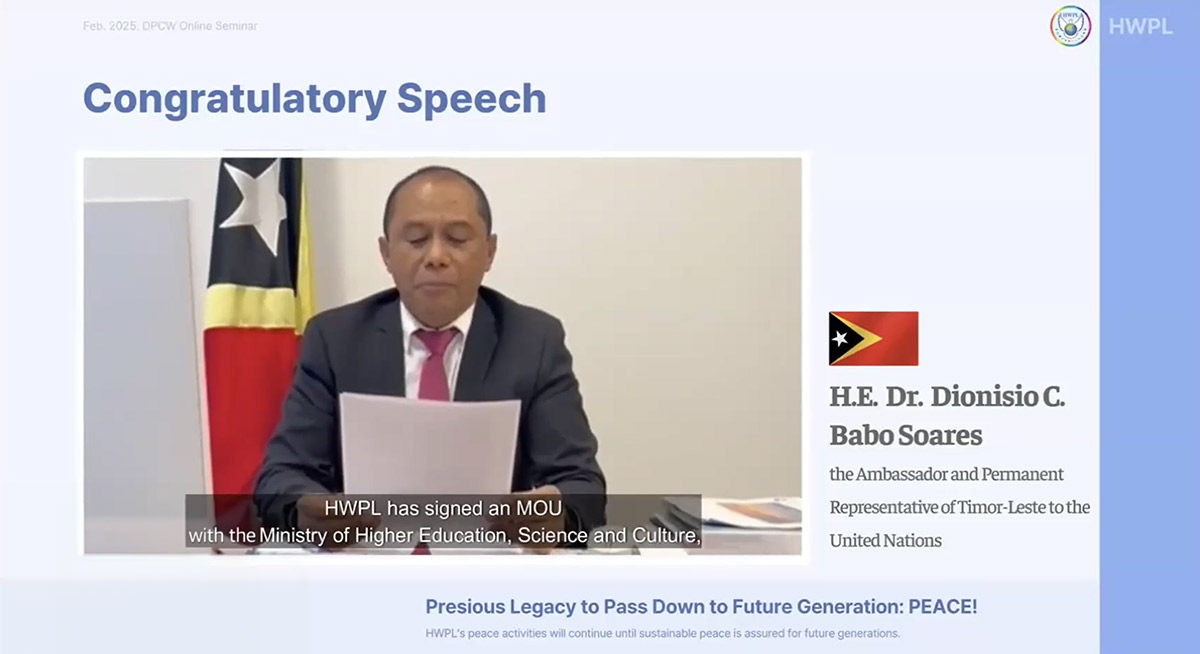
▲ Congratulatory speech – H.E. Dionísio Babo Soares, Ambassador of Timor-Leste to the United
H.E. Dionísio Babo Soares, the Ambassador of Timor-Leste to the United Nations, stated:
“Timor-Leste has also experienced the pain of conflict and has fought fiercely and earnestly to achieve peace. Now, we have overcome conflict, and we hope that our history serves as an inspiration for other nations still suffering from turmoil. Remarkably, we can discover the core values of the DPCW in the history of Timor-Leste. Timor-Leste held a national referendum, sharing the same spirit of ‘peaceful conflict resolution’ as the DPCW (Declaration of Peace and Cessation of War) in its pursuit of independence. Similar to the disarmament clause, a weapons collection program was implemented immediately after independence to ensure stability. Moreover, the government and civil society are promoting a culture that cherishes peace.”
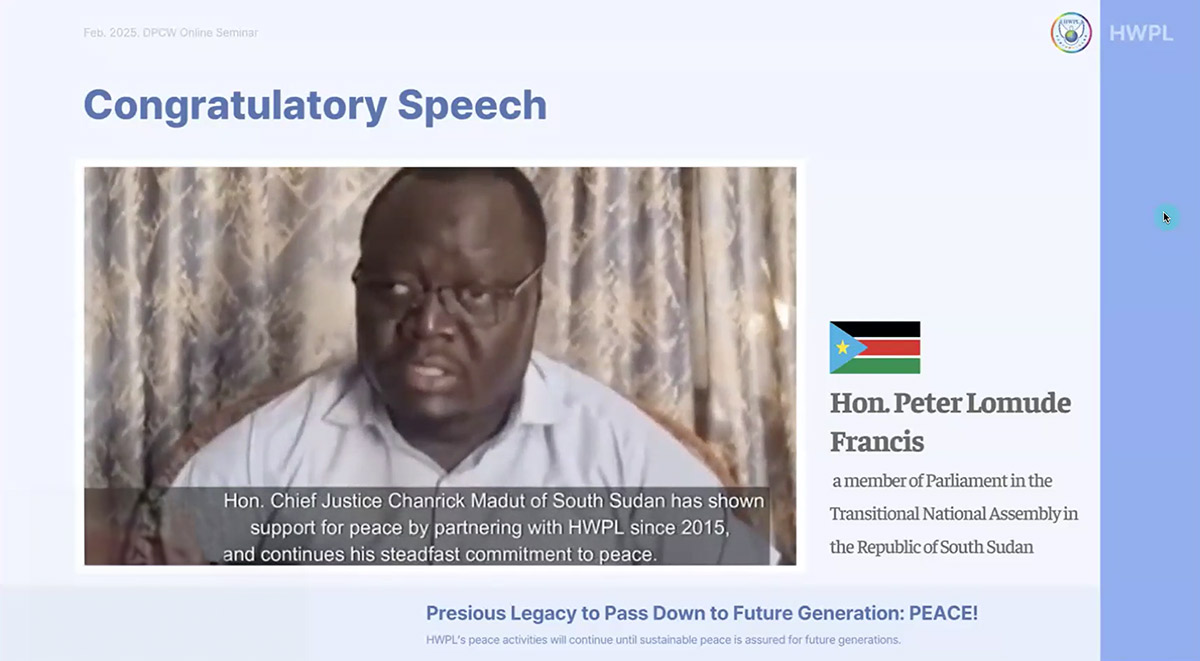
▲ Congratulatory speech – Hon. Peter Lomude Francis, Member of Parliament from South Sudan
Hon. Peter Lomude Francis, a Member of Parliament from South Sudan, stated:
“On May 15, 2024, His Excellency President Salva Kiir Mayardit of South Sudan made a historic decision by signing a national declaration officially endorsing the DPCW. This significant announcement was broadcast to the nation through South Sudan’s public broadcaster, SSBC, and has influenced other political leaders to follow suit in the peacebuilding process. As of now, 11 high-ranking government officials, including the Speaker of the National Assembly and the Chief Justice, have signed the declaration, reaffirming their commitment to global peace and the cessation of war. Notably, Chief Justice Chanrick Madut has been actively engaged in peace efforts in collaboration with HWPL since 2015 and continues his steadfast dedication to this cause.”
The seminar was conducted in two sessions. The first session introduced HWPL and the DPCW, explaining Articles 1 to 7 and highlighting how each article contributes to peacebuilding.
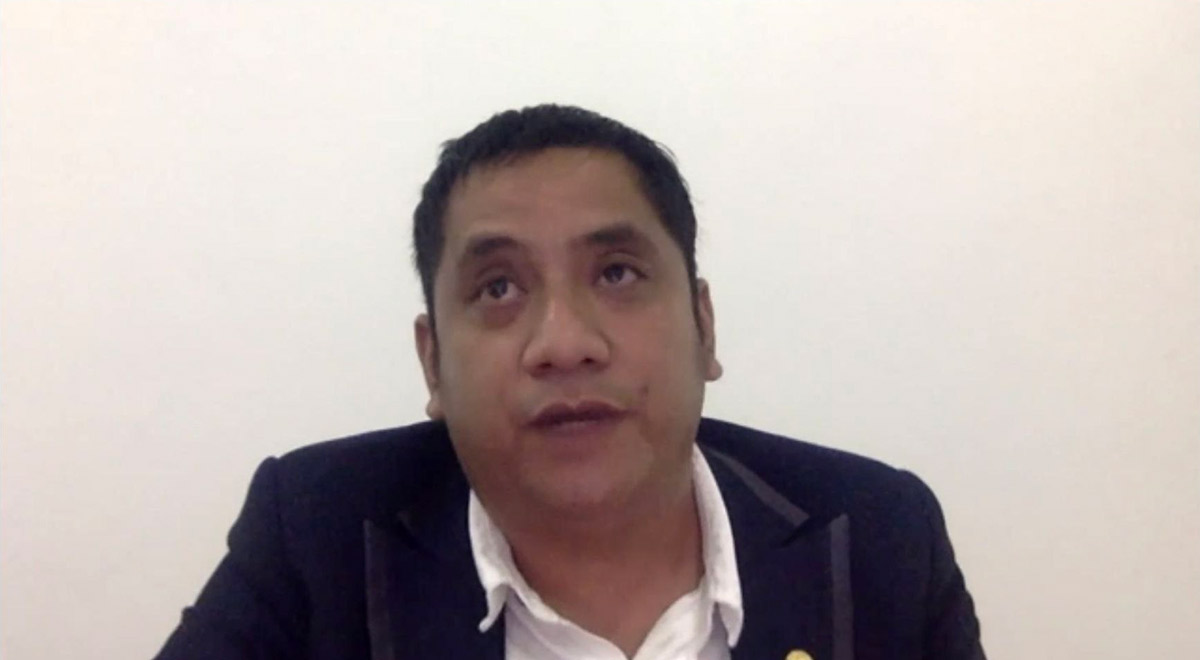
▲ Intervention – H.E. Jorge Soares Cristovão, Secretary of the State for Art and Culture of Timor-Leste
The second session focused on Articles 8 to 10 of the DPCW, followed by a presentation on the case of Timor-Leste. The seminar explored the historical experiences of Timor-Leste and their relationship with the DPCW. HWPL emphasized that each article should serve as a practical guideline for achieving peace, providing a detailed explanation of their meaning and applicability.
Notably, the seminar highlighted the similarities between Timor-Leste’s peace process and the principles outlined in the DPCW, offering concrete insights into the feasibility of implementing the DPCW. Additionally, H.E. Jorge Soares Cristovão, the Secretary of the State for Art and Culture of Timor-Leste, shared insights into the country’s journey towards peace and reconciliation.
In the final segment, participants shared their thoughts and discussed ways to collaborate for the realization of the DPCW. A lawyer from Myanmar expressed:
“War and conflict continue to plague the world, especially in Myanmar, which stands at a crossroads between war and peace. This situation threatens regional stability in Southeast Asia, making it crucial to find practical solutions for sustainable peace. The DPCW promotes peaceful coexistence among nations, fosters friendly relations and cooperation, and encourages dialogue to resolve disputes. In conflict zones, countless lives are lost, people are displaced, and crises like food insecurity, disease, and natural disasters worsen. To prevent these tragedies, we must unite as advocates and messengers of peace. Article 10 of the DPCW emphasizes spreading a culture of peace—an urgent necessity for Myanmar. By applying its principles, we can work toward sustainable peace and address the root causes and consequences of conflict.”
The seminar confirmed that the DPCW is not just a declaration but a practical guide for conflict resolution and peacebuilding. HWPL plans to continue strengthening cooperation with governments and civil society worldwide with the goal of having the DPCW adopted as a UN resolution.
HWPL Official Homepage


Gampaha, Sri Lanka – Heavenly Culture, World Peace, Restoration of Light (HWPL) successfully held the “Smart Gampaha Citizen HWPL Saemaul Undong (New Village Movement) Peace Walk” in Gampaha, Sri Lanka on February 22, 2025. The event began at the Saketha Reception Hall and ended at the Gampaha Botanical Gardens, with approximately 500 participants sharing the message of peace.
The event began with a keynote speech on peace by HWPL Chairman Man-hee Lee, followed by a congratulatory address by Hon. Neil Iddawala, Chairman of the Commission to Investigate Allegations of Bribery or Corruption (CIABOC). In his speech, he emphasized the importance of peace and cooperation and expressed his support for HWPL’s peace activities. In addition, the HWPL Sri Lanka Branch Manager and the Head of the International Law Department at HWPL Global 05 Branch in Korea gave speeches emphasizing the importance of HWPL’s peace initiative and the Declaration of Peace and Cessation of War (DPCW).
In particular, the event received a lot of attention as it was broadcast on Sri Lanka’s public broadcaster ITN (Independent Television Network). Through this, the purpose of the peace walk event and HWPL’s activities were introduced throughout Sri Lanka, and it became an opportunity to deliver the message of peace to many citizens.
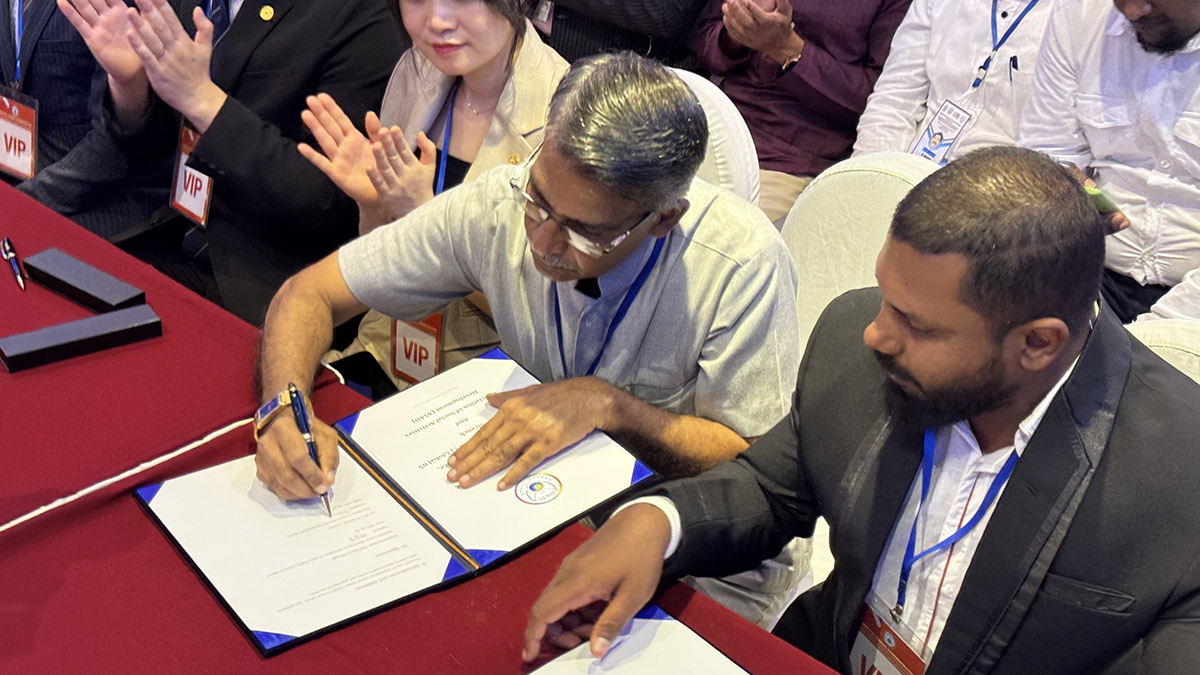
This event was attended by various organizations and groups, laying the foundation for cooperation, and in particular, three organizations signed a Memorandum of Understanding (MOU) for peace cooperation with HWPL.
– He has contributed to peacebuilding through community development and social support activities, and at this event he emphasized that inter-agency collaboration is essential for peace in the community.
– He runs a program for youth empowerment and social development, and stressed that this event is a valuable opportunity for young people to learn and practice peace.
– She stressed that education plays a key role in establishing peace, and urged students and communities to take an active role in establishing a culture of peace.
In addition to these, the event was attended by various organizations and educational leaders who discussed practical strategies for realizing peace within the community and pledged continued cooperation.
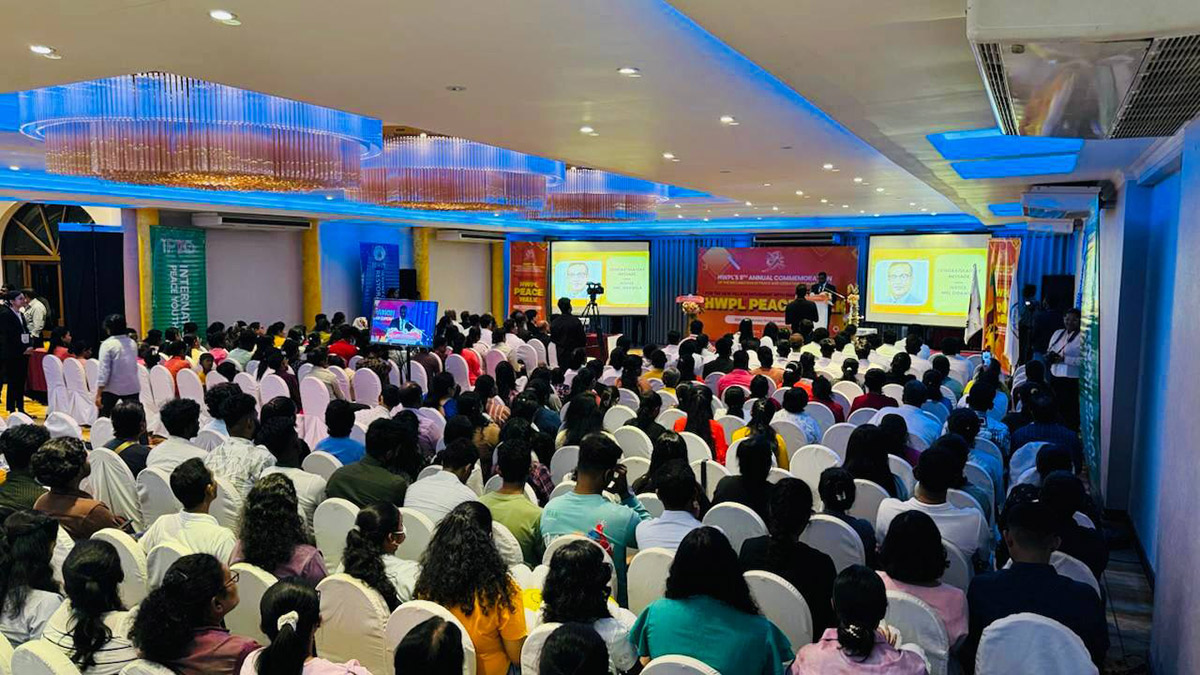
This peace walk event was held as part of HWPL’s global peace activities, and was held as an extension of the ‘Legislate Peace (LP) Program’ and the ‘9th Annual Commemoration of the Declaration of Peace and Cessation of War (DPCW).’ HWPL emphasized that integrating peace legislation and peace education into the national curriculum is a key strategy for long-term conflict prevention and reconciliation, and requested various organizations, groups, and individuals to participate in peace advocacy activities.
To this end, HWPL has dispatched a six-member delegation from its Global 05 Branch to Sri Lanka to hold meetings with government officials, educators, and civic leaders to discuss expanding the LP program, promoting peace education, and strengthening diplomatic cooperation.
The main objectives of this event are as follows:
- Promoting development in the Gampaha region – Applying the core values of the Saemaul Undong (New Village Movement), self-reliance, cooperation, and diligence to community development.
- Raising awareness of peace – Emphasizing that peace is an essential element in community development and encouraging citizens to participate.
- Strengthening social solidarity – Supporting local residents with diverse cultures and backgrounds to become one through the common value of peace.
- Encouraging youth participation in the peace movement – Providing youth with peace education and activity opportunities so that they can grow into future peace leaders.

The event was made more meaningful by the banners, flags and messages symbolizing peace and unity, and was followed by discussions on peace building and civic responsibility. In addition, local organizations, educational institutions and civic leaders collaborated to support sustainable peace activities, and through media coverage and SNS promotion, the peace message was spread beyond Sri Lanka to the world.
“Smart Gampaha Citizen HWPL Saemaul Undong (New Village Movement) Peace Walk Event”
– One Step Towards Peace
This peace walk event was not just an event, but a meaningful step that can leave a lasting impact in promoting peace, unity, and cooperation. HWPL encourages all stakeholders to participate in this event and join in creating a more peaceful society, and pledges to continue peace activities and international cooperation.
HWPL Official Homepage